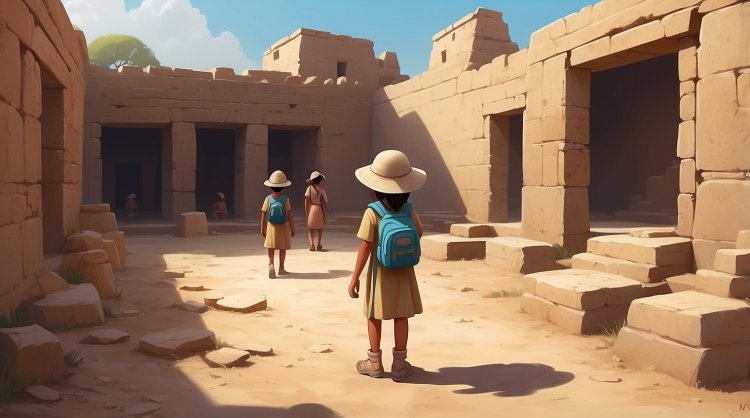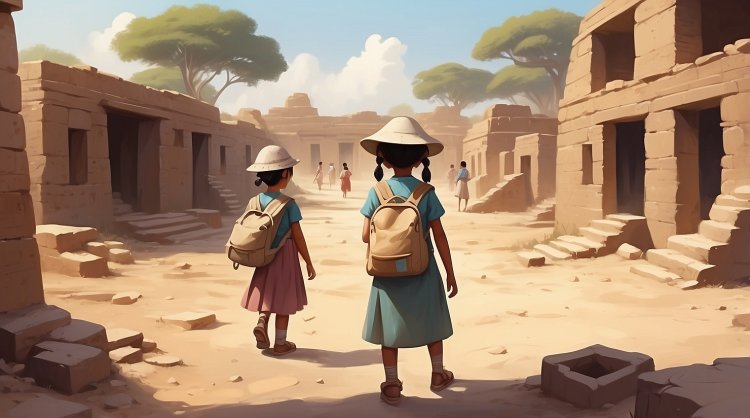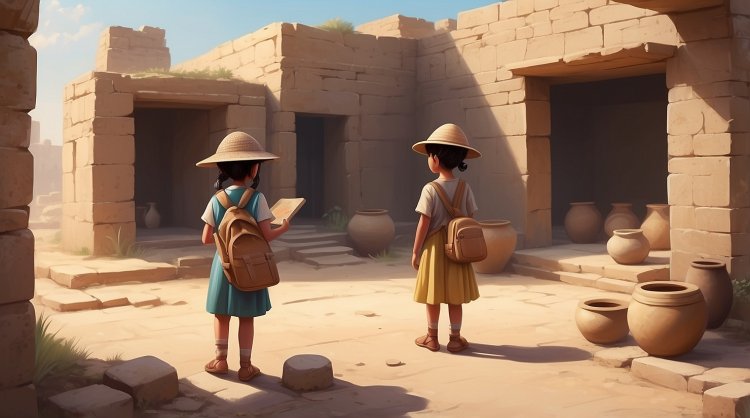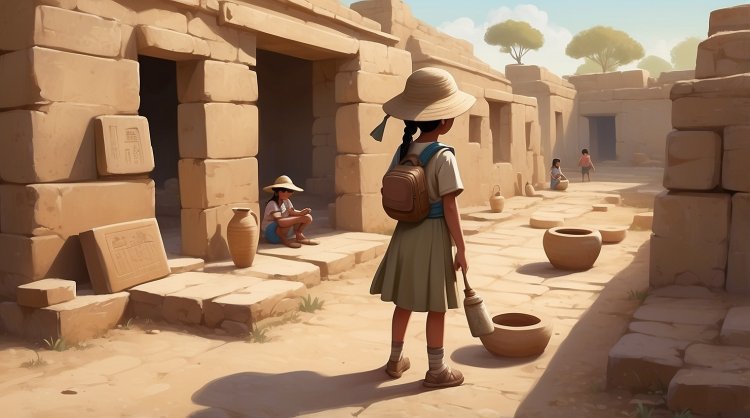The Mystery of the Ancient Musicians
Lena and Petya embark on an archaeological expedition to Harappa, one of the most important cities of the ancient Indus Valley Civilization. During the excavations, they find a unique musical instrument and soon find themselves in an ancient music workshop. By unraveling the mysteries of the sounds produced by these ancient instruments, they realize that music is connected to the disappearance of this civilization and may hold the key to solving its tragic fate.

Somewhere in the heart of India, far from the noisy cities and modern roads, Lena and Petya found something that immediately caught their attention. Among the shards of clay pots and stone slabs, a mysterious object was hidden, one that seemed to belong not just to an ancient art but to the very spirit of a lost civilization.

– Petya, look! – exclaimed Lena, pointing at the strange find. It was an ancient musical instrument, seemingly made of metal and stone, with unusual cuts and holes that resembled nothing they had seen before.
– Incredible, Lena! It looks like a musical instrument, – Petya marveled as he took it in his hands. – But how could it have looked in its original form? And why here, in Harappa? You know, this civilization disappeared many years ago...
Lena thought for a moment, looking at the mysterious instrument. Scholars are still debating the reasons for Harappa's disappearance, and there is still no consensus. But one thing was clear – music and culture played a significant role in the life of this ancient civilization.
They continued their excavation and soon found several more similar instruments. This was not just a find – it was a true musical legacy that could shed light on the forgotten stories of Harappa. They made their way to the local archaeological workshop, where researchers were working to decipher these ancient artifacts.

In the workshop, there were not only musical instruments but also records that archaeologists were attempting to decipher. Watching the older researchers at work, Lena and Petya concluded that the sounds produced by these instruments might hold the key to understanding the disappearance of Harappa.
– Did you hear what they are saying? – Petya asked, pointing to the conversation among the archaeologists. – They believe that the sounds of these instruments were used not only for music but for creating special rituals. It seems these sounds might have been connected to an ancient cult or practice, which ultimately led to the destruction of the entire civilization!
Lena furrowed her brow, delving into the details. – If this is true, we need to somehow recreate these sounds to understand what happened to Harappa. Maybe these instruments and their music were the cause of the great disaster that struck the city?
In the workshop, there was also an old recording device, which, as it turned out, could pick up even faint sound vibrations coming from these instruments. Lena suggested using it to try to reproduce the sound produced by the found musical instruments.
After several attempts, they finally heard the sound – deep, almost mystical, with characteristic echoes that might seem normal to a modern person. However, upon closer listening, the sound became stranger, and at certain frequencies, unexpected vibrations began.

– This is not just music, – said Lena, – it seems like it was a ritual. These instruments were probably used to create a special harmony or even to influence the surrounding world. I think it was this music, or rather its improper use, that led to the catastrophe in Harappa.
Petya nodded, realizing the scale of the discovery. – This is just incredible. We could be the ones to uncover one of the greatest mysteries of antiquity. Music, as a means of communicating with the forces of nature or the gods, could have played a crucial role in the fall of this civilization.
But what was even more important was that they understood these instruments were not just musical artifacts. They were part of rituals, possibly through which the ancient inhabitants of Harappa tried to connect with forces they could not control. And it was their attempt to "manage" these natural forces that might have been the cause of their destruction.
Lena and Petya decided to try again and reproduce the music by playing the found instruments. One by one, they began pressing different parts, and soon amazing sounds began to echo through the workshop. It was something unusual and exciting, as if these sounds held answers to many ancient questions.

With every new sound, the mystery became clearer. The understanding of how music could be connected to Harappa's disappearance would not leave them alone. Could it have been the result of some ritual that went wrong? Or did these instruments truly possess supernatural properties? Lena and Petya decided to continue their research, hoping to uncover even more secrets of the ancient civilization.
As it turned out, music was indeed the link that connected all the elements of Harappa's history – from its greatness to its tragic loss. The sounds of the ancient instruments became for Lena and Petya not just a tool for archaeological investigation but real magic, opening incredible horizons of history before them.

The mysticism of these sounds not only created an atmosphere of mystery but also led them to a great discovery. They already felt that revealing these secrets would be an important step for archaeology and history, and perhaps open new perspectives for all the scientists who continue to seek answers to the questions left in the past.
What's Your Reaction?




















